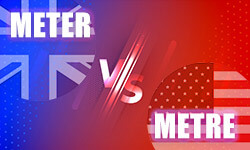
The worldwide spread of the English language has led to the emergence of numerous distinct dialects, each marked by unique spelling and phonetics. Striving for linguistic uniformity, especially in academic writing, is crucial to uphold the standards of academic integrity and ensure a coherent flow. The distinction of British English vs. American English is one of the most notable differences between English dialects. This article will examine the case of “meter” or “metre.”
“Meter” or “metre”
Both terms, “meter” and “metre” can act as nouns and verbs. It is primarily used as a noun in the context of measurement, where it refers to the fundamental unit of length in the metric system. It equals 100 centimeters or approximately 39.37 inches and is the standard measure of length in most parts of the world. In the context of music and literature, “meter/metre” refers to the rhythmic structure of verses, determined by the number and the length of feet in poetry or rhythmic pattern in music.
The word is often used in noun phrases, defining specific devices or instruments that measure or record the quantity or rate of something. “Meter” or “metre” is less commonly used as a verb. In its verb form, it describes the action of measuring or regulating the flow of something according to a metering device.

British English
metre
meter

American English
meter
In British English, “metre” is the preferred spelling in the context of measurement and poetic rhythm. However, when used as a verb or in the context of devices measuring and recording quantities, degrees, or rates, “meter” is the preferred spelling. On the other hand, the American spelling only accepts “meter” as the correct way of spelling, which is used for all contexts. Keeping uniformity within your paper is crucial for maintaining academic integrity and credibility.
Note: The “-re” suffix in British English is a notable feature that distinguishes it from American English. It reflects its historical etymological origins in French.
Examples of using “meter” and “metre” as a noun
As a noun, “meter” or “metre” has multiple definitions, each serving a different context. In the context of a unit of length, British English uses “metre,” however, in the contexts of rhythm and measuring devices, it follows the spelling “meter.” The following sentences will provide examples, outlining how “meter/metre” is used correctly in each dialect.
- British English: “Metre/meter”
- American English: “Meter”


Examples of using “meter” and “metre” as a verb
In both British and American English, the verb “to meter” is used, even though the noun form in the UK spells “metre.” The examples below showcase its correct usage.
- British English: “To meter”
- American English: “To meter”


“Meter” or “metre” in the “-ed” form
The “-ed” inflection of the verb “to meter” is “metered” in both British and American English. This inflection indicates the past tense or past participle of the verb, as outlined in the example sentences below.


“Meter” or “metre” in the “-ing” form
“Metering” is the “-ing” inflection of the verb “to meter” and implies a present participle or gerund. This spelling version is accepted in British and American English conventions. The examples below illustrate using “metering” as a gerund and present participle for a better understanding.
Present participle


Gerund


FAQs
While American English only accepts “meter,” British English uses both “meter” and “metre” depending on the context.
In the context of a unit of length, “metre” is the preferred spelling in the UK. However, in the context of rhythm in poetry and music, measuring devices, and as a verb, “meter” or “to meter” is the conventional spelling used in the UK.
In Canada, “metre” is primarily used, nonetheless, “meter” is also recognized as a correct way of spelling. Generally, the “-re” suffix is applied in Canada, like in Britain or France.
- ✓ 3D live preview of your individual configuration
- ✓ Free express delivery for every single purchase
- ✓ Top-notch bindings with customised embossing

